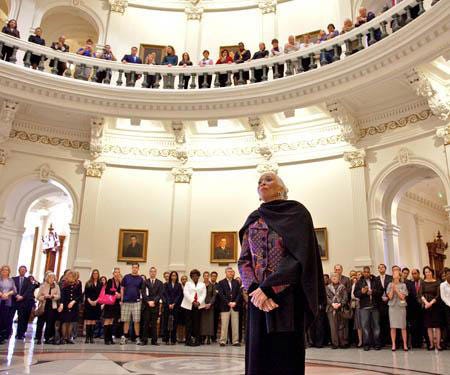When I Rise

A well-done documentary on Barbara Smith Conrad, who overcame a firestorm of racial controversy to become a successful opera singer, "When I Rise" is wonderful but feels like another drop in the bucket for racial injustice films.
I hope that doesn't in any way minimize the power this film should have, or the poignance of the story, because it's as powerful a story as any.
Barbara Smith was a student at the University of Texas in 1956 when she was cast as the lead in the musical "Dido and Aeneas," opposite a white male romantic lead. This, as you might imagine, upset the establishment's apple cart something fierce, and before long Smith found herself without a job, bullied out by a congressman who pulled strings with UT's administrators.
But Smith held her ground and fought the decision, and "Rise" is the story of that fight, told in documentary perspective from Smith Conrad herself as well as others who lived through the experience.
Later Smith Conrad became a world-renowned opera singer and became good friends with singer Harry Belafonte, who is featured in this film. Their friendship is instantly recognizable when one speaks of the other, and the look on Belafonte's face when he talks about her betrays his fondness for her.
The story itself is also interesting and at times fascinating, and there's a detachment upon listening to Smith Conrad discuss it, like an aunt or grandmother relating a story of her youth.
The interesting part to me is that given the racial climate at the time, she managed to be cast at all, and the fact that the production's director had the foresight to cast her grants just a small glimmer of hope into the thoughts at the time that not all of our grandparents were raging racist pigs.
From a filmic perspective, though "Rise" is well-shot and well-told, but there's not a lot of new ground being broken. Yes, her story deserves to be heard, and this film will be and should be played in theaters and on television around the country and around the world for years to come. But how does this story distinguish itself from the dozens of other great documentaries telling similar stories?
The film's high point is its climax, where Smith Conrad shows off her final triumph, that she continued to fight after this incident by singing a showstopping number that my miserable words here can't hope to adequately describe.
In that sense "Rise" doesn't tell a new story, or even tell it in a new way. My recommendation it's certainly worth seeing, tells a worthwhile story of overcoming prejudicial injustice. It certainly should take its rightful, deserved place in line of incredible stories of hope, rebellion and triumph in its genre, but in the end it's another in the line of dozens of those stories.
